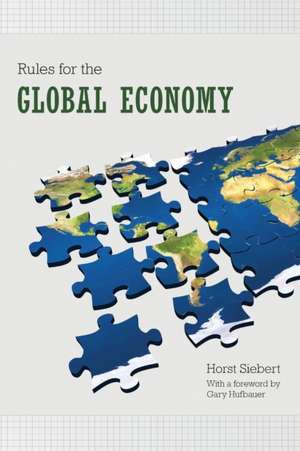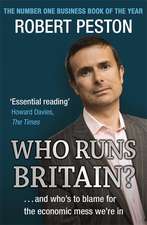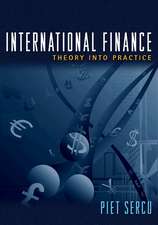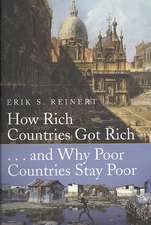Rules for the Global Economy
Autor Horst Siebert, Gary Hufbaueren Limba Engleză Paperback – 8 iun 2016
Using an accessible and nonmathematical approach, Siebert links the rules to four areas: international trade relations, factor movements, financial flows, and the environment. He looks at the international division of labor in the trade of goods and services; flow of capital; diffusion of technology; migration of people, including labor and human capital; protection of the global environment; and stability of the monetary-financial system. He discusses the role of ethical norms and human rights in defining international regulations, and argues that the benefits of any rules system should be direct and visible. Comprehensively supporting rules-based interactions among international players, the book considers future issues of the global rules system.
| Toate formatele și edițiile | Preț | Express |
|---|---|---|
| Paperback (1) | 221.99 lei 6-8 săpt. | |
| Princeton University Press – 8 iun 2016 | 221.99 lei 6-8 săpt. | |
| Hardback (1) | 584.31 lei 6-8 săpt. | |
| Princeton University Press – 6 aug 2009 | 584.31 lei 6-8 săpt. |
Preț: 221.99 lei
Nou
Puncte Express: 333
Preț estimativ în valută:
42.49€ • 44.19$ • 35.61£
42.49€ • 44.19$ • 35.61£
Carte tipărită la comandă
Livrare economică 13-27 martie
Preluare comenzi: 021 569.72.76
Specificații
ISBN-13: 9780691170923
ISBN-10: 0691170924
Pagini: 288
Dimensiuni: 187 x 232 x 23 mm
Greutate: 0.45 kg
Editura: Princeton University Press
ISBN-10: 0691170924
Pagini: 288
Dimensiuni: 187 x 232 x 23 mm
Greutate: 0.45 kg
Editura: Princeton University Press
Notă biografică
Horst Siebert (1938-2009) was the Heinz Nixdorf Professor in European Integration and Economic Policy at Johns Hopkins University's SAIS Bologna Center in Italy. His books include The World Economy, Economics of the Environment, and The German Economy (Princeton).
Descriere
Descriere de la o altă ediție sau format:
An examination of the conditions under which international rules of globalization come into existence, enabling world economic and financial systems to function and stabilize. It demonstrates that the rules result from a trial-and-error process - and usually after a crisis - in order to prevent pointless transaction costs and risks.
An examination of the conditions under which international rules of globalization come into existence, enabling world economic and financial systems to function and stabilize. It demonstrates that the rules result from a trial-and-error process - and usually after a crisis - in order to prevent pointless transaction costs and risks.












